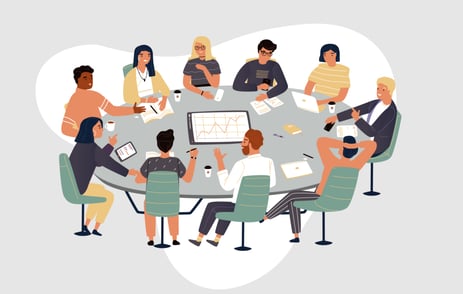When it comes to associations and nonprofits, there is no shortage of volunteer opportunities. However, few roles have as significant an impact as serving on an association committee. These groups work as an extension of the board of directors and are tasked with anything from day-to-day operations to major initiatives that can change the course of your organization.
Association committees are volunteer-based, and while they require a significant time commitment, they can also be a fantastic opportunity to get involved and gain experience.
So, how do you know if they’re a good fit for your volunteering time? Here’s everything you need to know before throwing your name in the mix for a committee opportunity.
Why Are Committees Important to Associations?
In associations and nonprofit organizations, committees are tasked with executing the board of directors' vision.
According to Board Effect, “The primary committees for nonprofit boards are the nominating and governance committee, the finance and/or risk committee and the executive committee.” These groups handle things like finding and onboarding new board members, managing the finances for the organization or resolving any issues between board meetings.
However, committee structures and responsibilities often depend on the organization's needs, with a mix of both standing and ad hoc committees that handle day-to-day operations, larger-scale projects and any special initiatives for the organization.
How Do They Benefit Organizations?
Although finding committee members can often be challenging for association leaders, their impact cannot be understated. Some of the ways they contribute include:
Accomplishing More with Less
Because staff and budgets are limited, volunteers will always be an essential pool of talent for organizations. However, forcing one or two volunteers to handle everything likely won’t work. Committees allow boards of directors to break their big-picture strategies into smaller initiatives that a group of volunteers can run. Similarly, with a range of professional skills and insights, diverse committee members can help organizations take more specialized approaches to a range of issues.
Better Member Insights
In many cases, the people contributing to or sitting on a committee are either members or professionals involved in the industry. And this connection is extremely valuable. Merrill Green, Member Engagement Manager for the Emergency Nurses Association, says, “we tend to push out stuff as associations and say, ‘here's what we think you need.’ (Committees) show that you're listening to your members and getting them involved in the process.”
Allow Boards to Be More Effective
Because committee members are closer to the “action” in an association, they often have insights that help boards be more effective. Whether that means status updates on projects, feedback from members or roadblocks that can be solved at a higher level, the better the dynamic between the boards and their committees, the more effective the organization as a whole.
Association Committees In Action
While it’s easy to see how association committees are involved in an organization, understanding the tangible impact is essential.
Creating Safe Work Initiatives
At the Emergency Nurses Association, committees have been tasked with healthy work environment initiatives. “Emergency nurses, in particular, have a very dangerous work environment. There's the physical danger and then there's the mental strain of dealing with things that emergency nurses deal with on a regular basis, especially throughout COVID,” says Green.
By forming a committee, the ENA was able to truly understand the needs of its members, looking for solutions to many of the issues they’re facing daily.
“People sitting around talking about these issues without having input from an actual nurse, who are there and experiencing this every day would be like you and I talking about how doctors should solve COVID. We don't have the expertise or the education to really solve that problem,” she continued.
Equity and Salary Decisions
To gain insights into their staff's needs, Choose 180, a Seattle-based non-profit, used a committee to complete a compensation evaluation.
During these sessions, committee members interviewed the staff, director and executive director, asking key questions, including what came to mind with value-based compensation, who should be involved in these decisions and what kind of work should be highly valued at the organization.
As Executive Director Sean Goode puts it, “At the end of the day, what it created was a groundswell within our organization that told me something needed to be done. Ultimately, the survey in this process created the basis we needed to do it right and do it well.”
The resulting conversations led to more transparent communication on salary and a new minimum starting salary of $70K for all staffers.
Mentoring Young Professionals
Committees can sometimes handle member communication and onboarding, but may also take particular interest in assisting young professionals.
While Dana Johnston spends her time as Senior Manager of Convention Operations and Meetings for the Infectious Disease Society of America, she also joined an emerging professionals committee for PCMA in 2019, which helps pave the way for students or professionals with three to five years of experience or less, gain the skills they need to build a career in the industry.
“Last year, the co-chair and chair developed a coffee and conversations initiative. What we're doing is conducting Zoom interviews with folks within the events professional space who have made it to a certain level of success. We're talking to them about what they did to get there, what challenges they faced, how they overcame them and what tips they would offer to an emerging professional to make it where they are someday?” says Johnston.
“What emerging professionals want is, ‘how do I get from where I am,’ whether that's a recent grad, or they're in school, or they're just two years in as a coordinator, ‘to that director level, VP level, or CEO level?’ And so that's what we're trying to highlight through the coffee and conversations program.”
What Should You Know Before Joining?
Association committees are always looking for volunteers, which means if you send out an application, chances are you’ll have an opportunity. However, this is not always the best situation if you don't ask yourself a few particular questions.
Understand Your Availability
While association committees are volunteer roles, their importance to the organization's overall direction makes them a serious commitment. That’s why the most critical question you should be asking yourself is how much time you’re willing to commit.
“You need to think about where am I at in my career right now?” says Green. “Can I handle this committee assignment? Can I meet the requirements of the position as described? And will my current job support me being on this committee?”
Think Through Your Interests
Because association committees cover a range of topics, there are plenty of opportunities for you to find a role that fits your interests and skills.
“Find what you're passionate about and try to get involved in that,” says Green. “A lot of times, it's what you’re a subject matter expert in. What piece of information do you know that not everybody knows? That's where you're most valuable.”
Challenge Yourself to Grow
While waiting until a call for volunteers opens or joining a committee that compliments your skills is great, you should also be proactive in looking for opportunities and understanding how they fit your career trajectory.
Whether that means taking a leadership role on a committee or joining an association that covers an industry you’re interested in, “the best way to get involved is just to ask the organizations you're interested in what you can do to help them,” says Johnston.
Why Should You Join an Association Committee?
Joining association committees can be a significant investment in terms of time and responsibilities. While all professionals should feel inspired to give back, the reality is that volunteering experiences also need to be valuable to the professional.
“Volunteering is one of the most selfish things you can do because of how rewarding it is to you,” says Johnston.
Some of the biggest perks you can expect from joining an association committee includes:
- Networking – Whether you’re working with other professionals as part of your committee responsibilities or meeting directly with the board of directors, committee involvement can help you grow your network and reach within your career industry.
- Organizational Impact – Committees impact many of the programs within an organization. “If something comes out of the work you're doing on the committee, like an actual work product, and you see it in action, you can feel really good knowing that I contributed to that,” says Green.
- Professional Development – Whether you want to improve your ability to communicate or gain valuable leadership skills, joining a committee is a way to get that training in the field. Not only do you need to work with your fellow committee volunteers but also with members and professionals throughout the industry.
- Communication – As an association professional, being able to communicate and lead are imperative. As Johnston puts it, “when you work with people at your employer, you know them pretty well and you talk to them every day. But when you're working with volunteers throughout the capital chapter region or Washington DC region, I'm meeting people I never met or talked to before. And there's a whole set of new communication skills that you have to learn.”
Of course, joining a committee will have a lasting impact beyond your professional growth.
“My job may have been crazy today, but that half-hour I spent on that volunteer work for that committee was really rewarding, and it'll pay forward for generations,” says Johnston. “If I'm good at my job, I'll get a raise and a promotion. But if I can't help other people achieve that, too, I have no legacy – being on a committee lets you build your legacy.”

July 12, 2022

